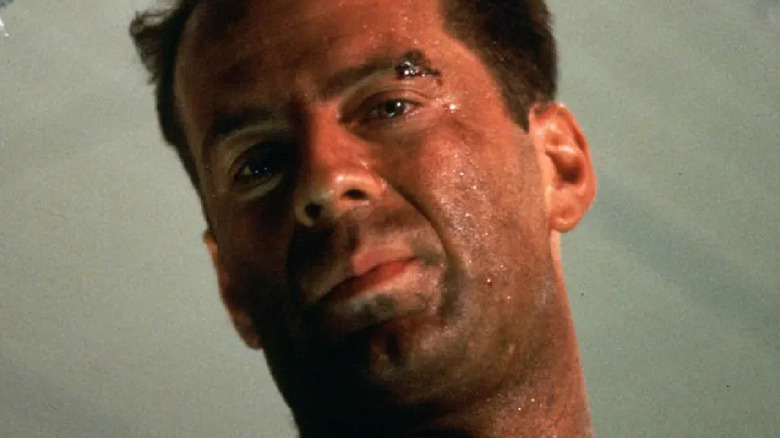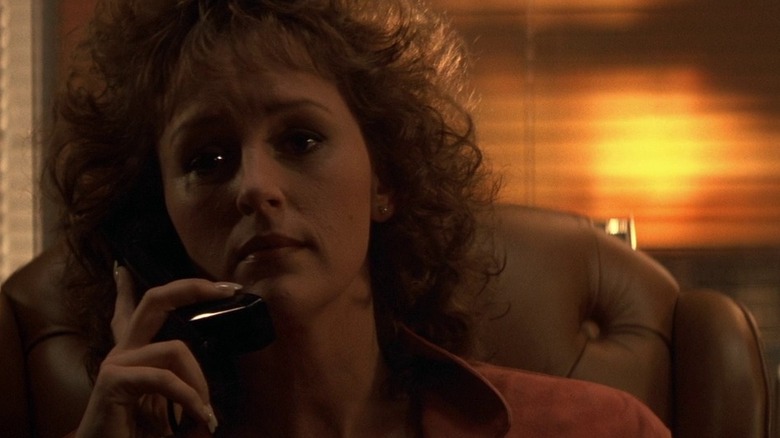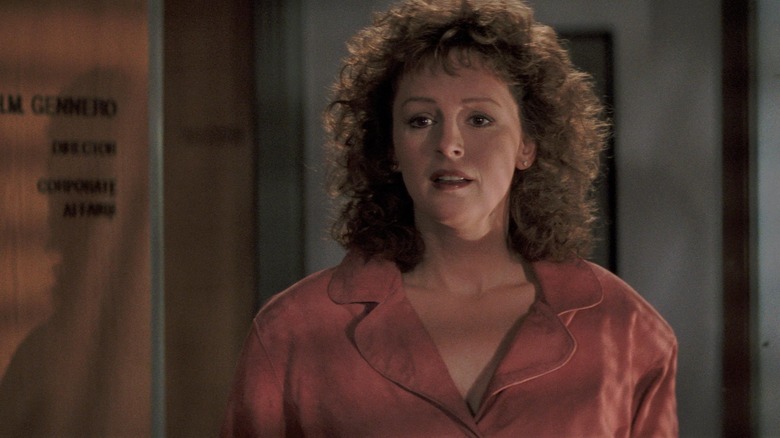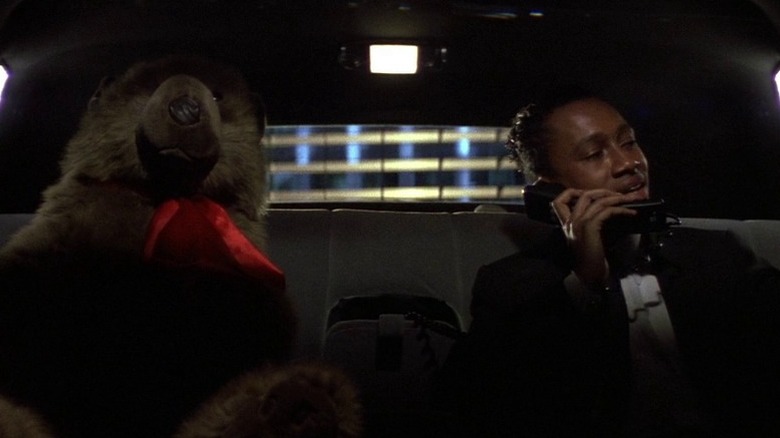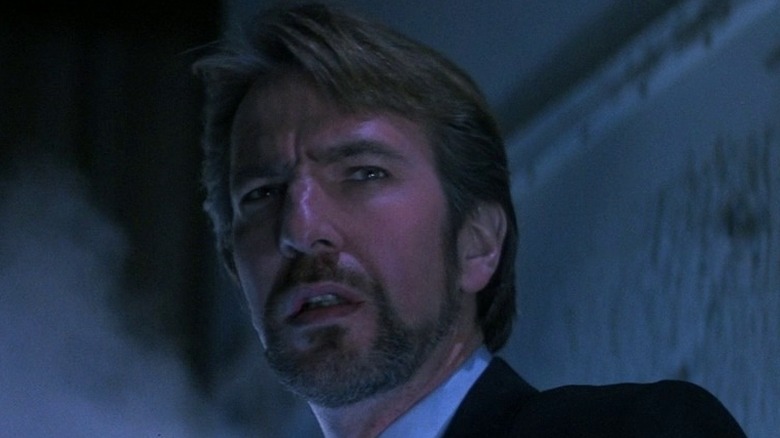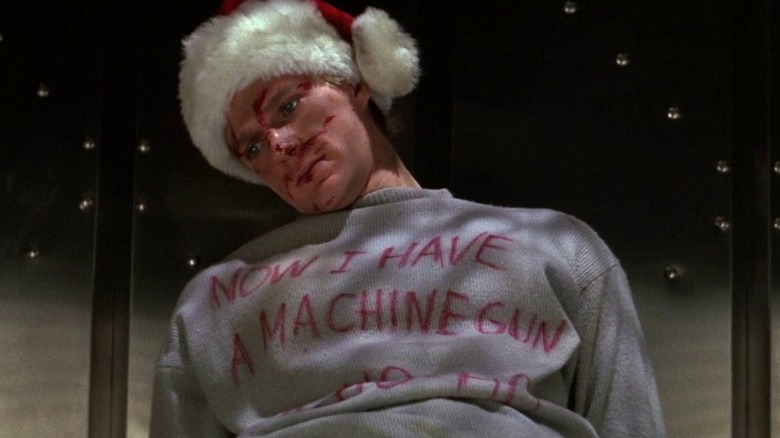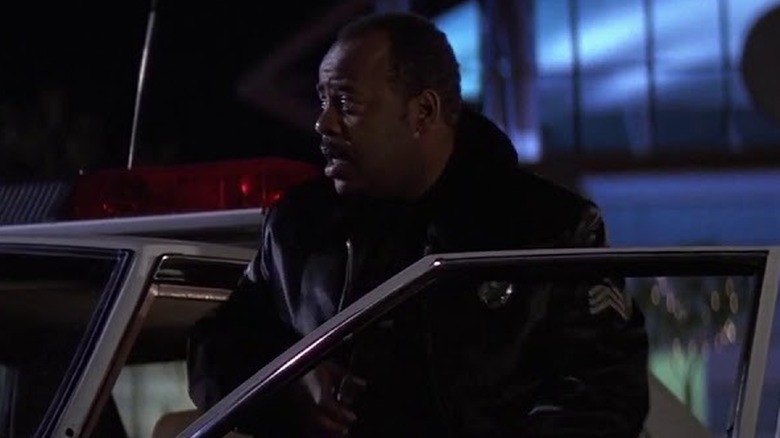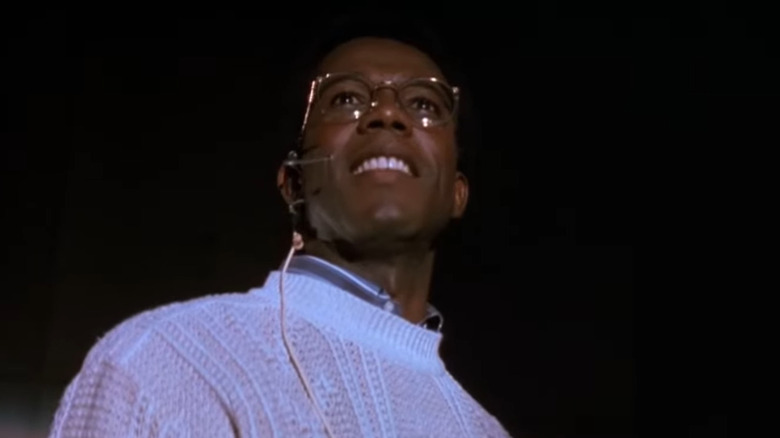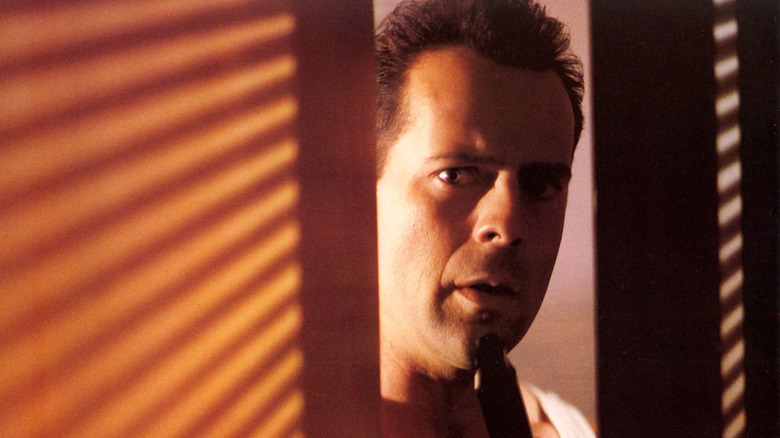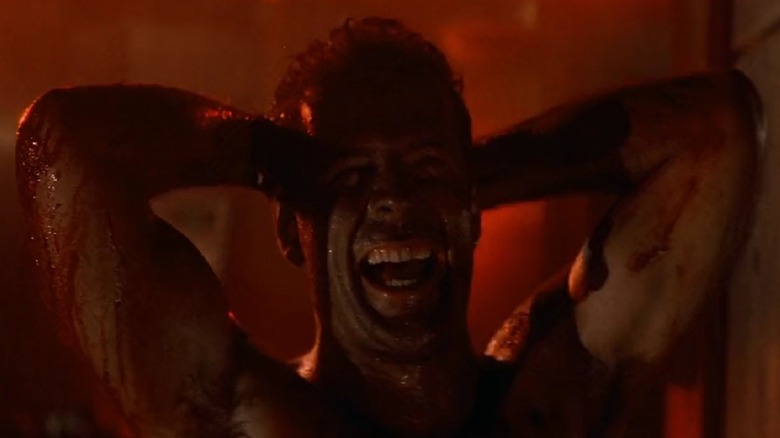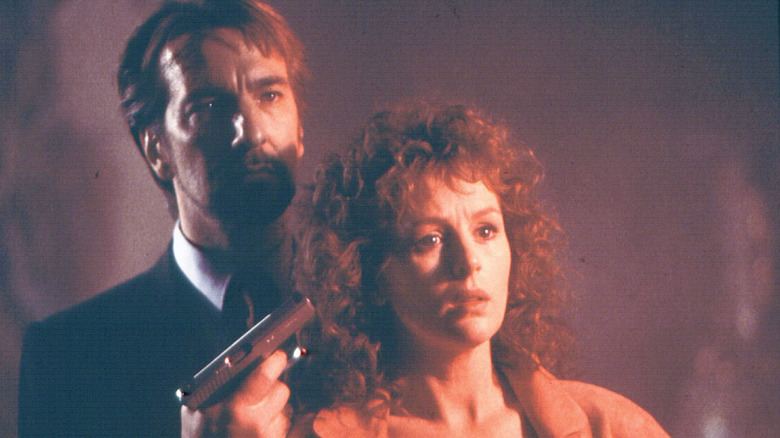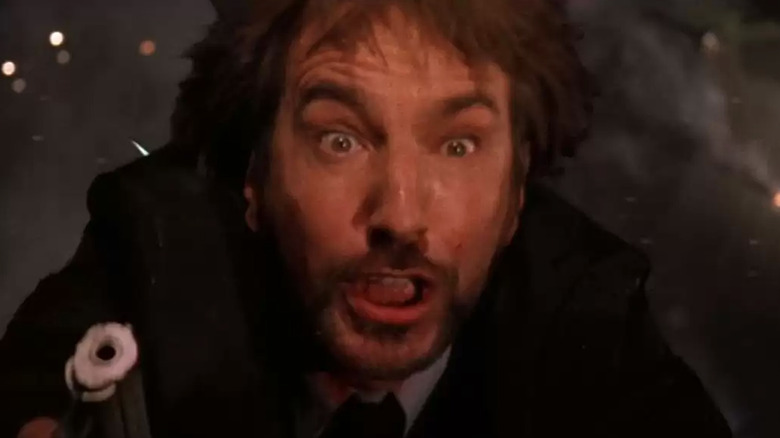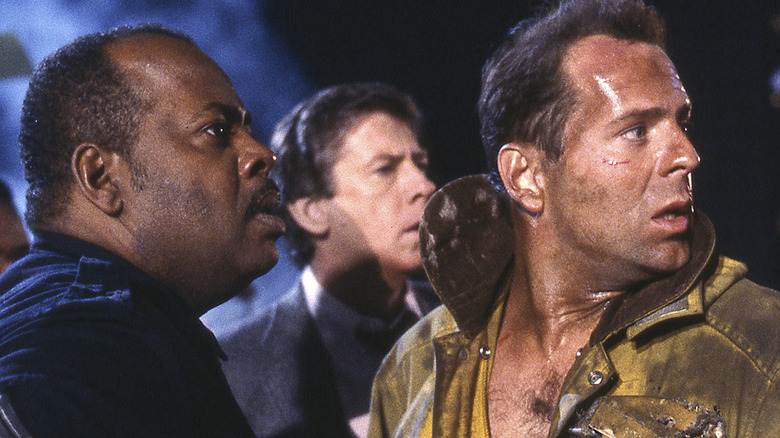12 Details That Make Die Hard A Christmas Movie
Is it or isn't it? It's a question that has plagued critics' groups, disrupted family gatherings, and pitted friends against each other since 1988. Okay, maybe there haven't been any knockdown, drag-out fights over it, but ever since its release, the question of whether or not "Die Hard" is a Christmas movie has been hotly and routinely debated.
We've been there too, down in the trenches. We feel your pain. Isn't there enough chaos and uncertainty in the world without having to spend every holiday season arguing with your cousins about something so clearly observable and knowable through evidence? Isn't it time we move on to a new question for the ages? We say yes, and so we have taken the time to meticulously study the historical record (i.e. watch the movie over and over) just in time to give you the definitive answer to this puzzle and put the issue to bed forever. "Die Hard" is unequivocally a Christmas movie, and we have the facts to back it up. Trust us: it's science.
It takes place on Christmas Eve
It's amazing how many people think that "Die Hard" taking place on Christmas Eve is insignificant, because nothing goes into a movie by mistake. Months before a single frame is filmed, every scene is meticulously planned several times over by people in multiple departments and capacities. From the original screenwriter to the storyboard artist, the set designer, the cinematographers setting up the camera shots, and the costumers planning the looks of every single person to appear on screen, no detail of what the final product should look like isn't already known. At the end of the process, all the scenes are cut together to tell whatever story they mean to tell, with whatever details are pertinent.
So when "Die Hard" begins and the flight attendant at Los Angeles International Airport says "Welcome to Los Angeles and have a very Merry Christmas," that's intentional. All the trees lit up in foyers were put there on purpose. The entire conversation between Holly (Bonnie Bedelia) and Ellis (Hart Bochner) about whether they should go out that night after the office party (she's against because: Christmas, he's for because: Ellis) is in the movie because director John McTiernan felt it served a purpose to the story. The film could have been set on New Year's Eve (or any other day) if that's what the director wanted, but it wasn't. It's Christmas for a reason at Nakatomi Tower, and that fact can't be overlooked.
Her name is Holly
In an unofficial survey of women we've met who were born in December, a full 75% of them have Christmas names: Holly, Ivy, Noelle, Nichole (for St. Nick), Kris (as in Kringle), Mary, Joy, et cetera. If her first name isn't related to Christmas at all, it jumps to an 80% chance that her middle name is Noelle. And to all you Holly Noelles out there doing double duty, thank you for your service.
This is not to say, of course, that Holly Gennaro McClane was born in December, but rather she is another representation of Christmas itself. Many Christmas movies are in some way a reiteration of "The Boy Who Saved Christmas." Santa, or the toys, or the very concept of goodwill are in danger, and one pure-hearted person or song or ghost epiphany must rescue us from ourselves. "Die Hard" is exactly that. Holly is Christmas. Hans (Alan Rickman) and crew are the threat to her continued existence, and John (Bruce Willis) is the brave soul with a heart that is true who will break the grip that evil has on Christmas, giving it back to the people.
Sure, Christmas and the hero are on the outs at the beginning, but that's because he has to find his way back to his priorities too. The parallels are obvious.
Argyle hangs out just like a stocking
Argyle is not a common name for a man, but argyle is a common pattern for socks and other hosiery — in other words, stockings. Stay with us here.
When John's surprise limo driver Argyle (De'voreaux White) appears at the airport to pick him up and take him to Nakatomi, it's an unexpected novelty. After dropping him off, Argyle pulls into the underground garage for no discernible reason and hangs out, waiting for John to get back to him, and then for the bulk of the movie stays there unacknowledged. It's not until "Die Hard" is nearing its end that Argyle packs a punch, crashing into villain tech guy Theo (Clarence Gilyard Jr.) and knocking him unconscious, then surprising everyone by showing up to drive John and Holly home.
Not to be too on the nose, but Argyle the character actually does fill the role of a Christmas stocking quite well. To wit, Christmas stockings are hung on our mantelpieces and other high surfaces for no discernible reason, waiting to be filled with unexpected novelties and delightful surprises. Occasionally, their contents might shock us, packing an emotional punch. We generally don't think about them until everything else is done, be it shopping for those elusive stocking stuffers or remembering what was in them along with everything else we got. Some may say we're stretching the metaphor, but if you don't stretch out your stockings you'll never be able to fit anything good inside.
Hans is the Grinch
Upon being interrogated for the access code to the vault security system, Nakatomi bigwig Mr. Takagi (James Shigeta) is insulted to learn that these men invading his Christmas party are not terrorists with a cause but petty thieves. His downcast sneer and the tone of his voice convey how revolted he feels. This whole operation is utterly beneath him and he's not afraid to be all "disapproving dad" about it. Hans, for his part, could not care less. All the holiday joy in the world can go the way of the dodo as far as Hans is concerned, just as long as he gets his $600 million plus interest.
Even when Hans is identified by the news, his former radical terrorist group disavows his connection to them. His operation is not about ideas, about defending or justifying a way of life, but about getting paid in a major way. As he tells Holly near the end of the film, he is "an exceptional thief." Of course, one of the most notorious thieves in Christmas lore is the Grinch. In the Grinch's case, it's little Cindy Lou Who that touches his heart and the song of Christmas cheer that makes him change his ways. Hans never does have a change of heart in "Die Hard," unless you count the one caused by that bullet.
John sends grisly Christmas message
When John accidentally kills terrorist Tony (Andreas Wisniewski) during a fight in which Tony tumbles down some stairs and breaks his neck, our intrepid hero takes the opportunity to avail himself of Tony's weapon and walkie talkie. (Sadly, he can't use Tony's tiny shoes.) John also knows that with Tony's death, he can no longer hide his existence from the other bad guys in the building. They're going to notice their comrade's disappearance, if not literally stumble upon his body, sooner rather than later. McClane's best move, then, is to announce his presence with authority and bravado.
Hilariously, just as Hans is telling his hostages that they are powerless to stop his plan and he has everything in total control, the ding of the elevator's arrival rings out on their floor, followed quickly by a woman's blood-curdling scream. Fastened to a chair and wearing a Santa hat is Tony's corpse, and written on his plain gray sweater is, "Now I have a machine gun. HO-HO-HO." The snide framing of this information could be chalked up to John's natural wiseacre attitude, and on the surface that's exactly what it is. On another level, however, McClane isn't just conveying information; he's issuing a challenge. He has weaponized Christmas, and he's coming to save the day — just try and stop him.
Nobody believes
Another big recurring theme of Christmas movies is a lack of faith. Whether people have lost their faith in Santa Claus or God or just the nebulous spirit of Christmas, the movie's protagonist must make the others believe again — and/or come to believe again himself — in order to save Christmas. In the case of "Die Hard," John McClane has to make the police believe that there really is a hostage situation at Nakatomi Tower in order to have any chance of surviving the night.
Despite a couple of ingenious attempts to contact emergency services, McClane has to literally throw a corpse out a window onto the patrol car of Sgt. Al Powell (Reginald VelJohnson) to get the authorities to take notice. Even then, Deputy Chief of Police Dwayne T. Robinson (Paul Gleason) remains unconvinced. The people in charge take no heed of McClane's observations or advice, proceeding haughtily and haphazardly into action. The S.W.A.T. team arrives to force entry into the tower, running to the entrance in full view of the building despite their inferior vantage point. As Theo watches over the security cameras, he narrates their approach for the gunmen lying in wait in the style of "The Night Before Christmas."
Thankfully for John, the missiles that destroy the S.W.A.T. vehicle are pretty convincing. Law enforcement may remain largely unhelpful for the rest of the movie, but at least they finally realize that the threat is real.
It's Christmas, Theo!
Throughout "Die Hard," Theo's main job is to crack the seven different locks to the Nakatomi vault. Each one is a different type of mechanism and will require various skills to open. Theo repeatedly lets Hans (and the viewers) know that the first six will take time, but he will successfully crack them. The last one, however, features electromagnetic circuits that will apparently freeze everyone out if the power to them is cut within the building. He's skeptical that they can get in, but Hans has a plan.
When Hans checks in on the status of the locks a while later, Theo says he's at the sixth but reiterates that it's going to take a miracle to get into the seventh. Hans gleefully responds, invoking the spirit of the season, "It's Christmas, Theo! It's the time of miracles. Now be of good cheer and call me when you reach the last lock." When he does, Hans smugly offers up the appearance of the FBI on the scene as the aforementioned miracle. Following what Sgt. Powell calls the "Universal Terrorist Playbook," the feds order the power company to shut off the juice at the grid, and the seventh lock is no longer engaged. As the door opens and the crescendoing chords of "Ode to Joy" boom over the soundtrack, Theo has the expression of a kid coming downstairs to see piles and piles of presents. "Merry Christmas," he whispers in awe. Merry Christmas, indeed.
Up on the rooftop and down the chimney he goes
There are a few recognizable locations within the Nakatomi building in "Die Hard," but most of the unused floors John travels between tend to run together in a blur — except, that is, for the roof, the heating ducts, and the elevator shafts. Just as in most Christmas tales, the roof is the sight of pivotal activity, as we wait all night for flying machines to land there. The criminals plan to invert the narrative, however, by blowing up the roof with all the hostages and FBI helicopters on it to make it seem like they, too, died in the blast.
As for the heating ducts and elevator shafts, these work in concert to represent a chimney. The ducts are, of course, how the heat travels through the building in the modern era now that fireplaces are no longer required. The shafts are vertical conduits spanning the building that someone could use to access each floor, like a chimney. McClane even starts a massive fire in one when he straps some C-4 explosive to a chair, lights it, and tosses it down the shaft.
And it must be said, Bruce Willis in "Die Hard" is a far cry from Dick Van Dyke in "Mary Poppins," but McClane gets so filthy with soot crawling through these spaces that even his shirt changes color in protest.
Holiday tape
It's the moment of truth. Hans has taken Holly captive and is readying his bags with all his loot. John has the jump on him but he's down to his last two bullets. Pondering his next move, he spots some packing tape decorated with holly (heh) and the phrase "Season's Greetings" in a repeating pattern. Inspiration strikes.
When he confronts him, John returns to his easy wiseacre, take-no-guff personality and allows for just enough snarky conversation to pass between them to put Hans at ease and make him feel he has the upper hand. They share a laugh over a memory from their first encounter, then the camera reveals what John has not.
Taped loosely to his back, wishing us all "Season's Greetings," is his handgun. John shouts a quick warning to Holly, and seconds later both Hans and his cohort have been hit by those final two bullets. Christmas has saved Christmas. It has avenged itself, just as, in other Christmas movies, people are called upon to defend their homes and preserve Christmas in times of trouble. Yippee-ki-yay, indeed.
Chekhov's expensive gift
Russian playwright Anton Chekhov is known as much for his rules of writing as his plays. The concept known as Chekhov's Gun states (via Britannica) that if a gun is referenced in the first act of a play, it must be fired by the final act, which is a metaphorical way of saying that every element of a story should be essential to that story. Nothing should be included without a purpose. In "Die Hard," for example, Ellis makes a big deal about talking up the Rolex watch Holly receives as a gift from the team for her hard work. The Chekhov's Gun principle says that the watch must come up again in service to the story. So when John quietly tells Ellis he'll see it later, rest assured that he will.
When the watch returns in the final act, it has to make an impact big enough to remind the audience of its significance — and it does. As Hans is struck in the chest with John's second-to-last bullet, he doesn't collapse immediately. He staggers backward toward the windows, Holly still in his grip. He falls through the glass and she nearly falls with him, John rushing to the rescue. Hans has hold of her watch, so John undoes the clasp and Holly is saved as Hans plummets to his doom. The watch, mentioned for no other reason than for the audience to know that it's there and that it's important, has fulfilled its destiny.
It's the time of miracles
Anyone who's seen "Inception" knows that when the body feels it is falling, it reflexively reacts to try to catch itself (via Science Facts). In "Die Hard," it is nothing short of a miracle that Hans does not display this innate motor reflex as John releases the clasp of Holly's watch and Hans falls to his death.
Hans, you see, is holding his gun in his other hand, and is raising it — finger on the trigger, prepared to shoot McClane — when the watch opens. As his body begins to fall, his reflexes should kick in and grasp for purchase. In this case, that would almost certainly mean pulling the trigger of his gun, simply because that's where his hand happens to be. But he doesn't do this at all. He falls back in shock, arms and legs akimbo, the gun no longer any more of a threat than Hans himself.
Some may chalk this lack of reaction up to the fact that Alan Rickman was acting out a scene and was planning to fall, disabling the reflexive action in his mind. But according to The Hollywood Reporter, Rickman was actually tricked about the timing of the fall so that his reaction would be genuine. That lack of reflexive grasping was indeed a Christmas miracle. Bye bye, Hans.
The soundtrack
Aside from Beethoven's "Ode to Joy," which permeates the film, "Die Hard" is chock full of Christmas songs. Both the opening and closing credits, in fact, feature "Winter Wonderland" and "Let it Snow," providing festive bookends to the movie's content. Since the soundtrack is added in post-production, that may be categorized as a possible afterthought. In the limo with Argyle, however, John specifically asks for Christmas music, only to be informed that the song playing over the limo's stereo — "Christmas in Hollis," by Run-DMC — is Christmas music.
Additionally, both McClane and Powell fill their idle time by whistling or humming traditional carols to themselves. Why do all this, why provide this direction, why leave it in the film and add further supporting elements to it, if "Die Hard" isn't meant to evoke the uplifting feeling of a man coming home to his family for Christmas?
It's time to face the holiday music and admit the truth once and for all: "Die Hard" is a Christmas movie. Argyle for one can't wait to see what happens at New Year's.
